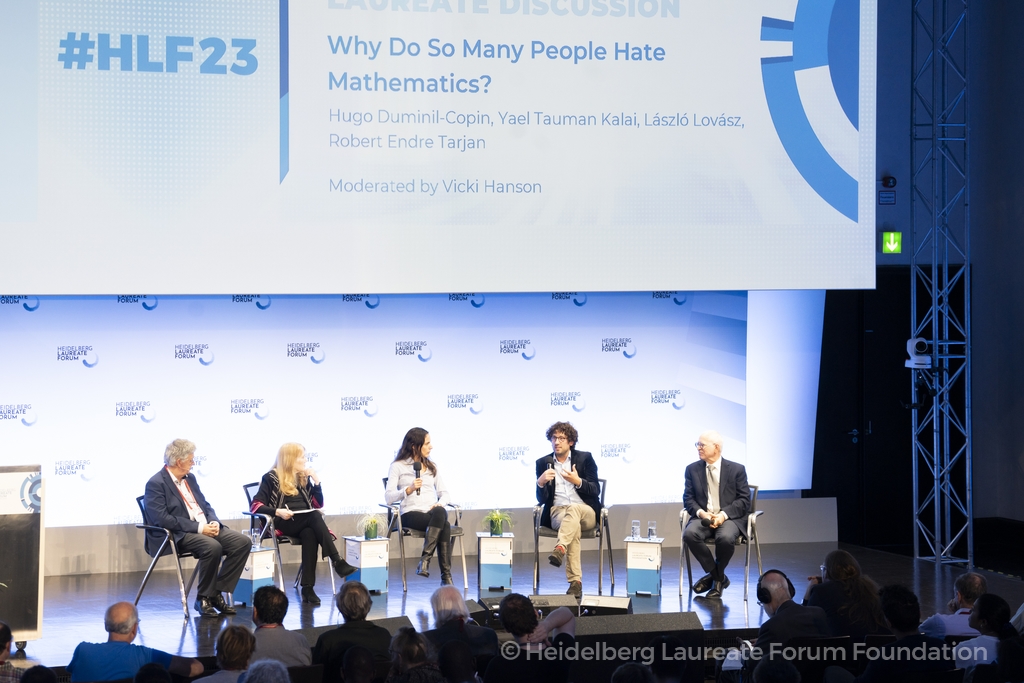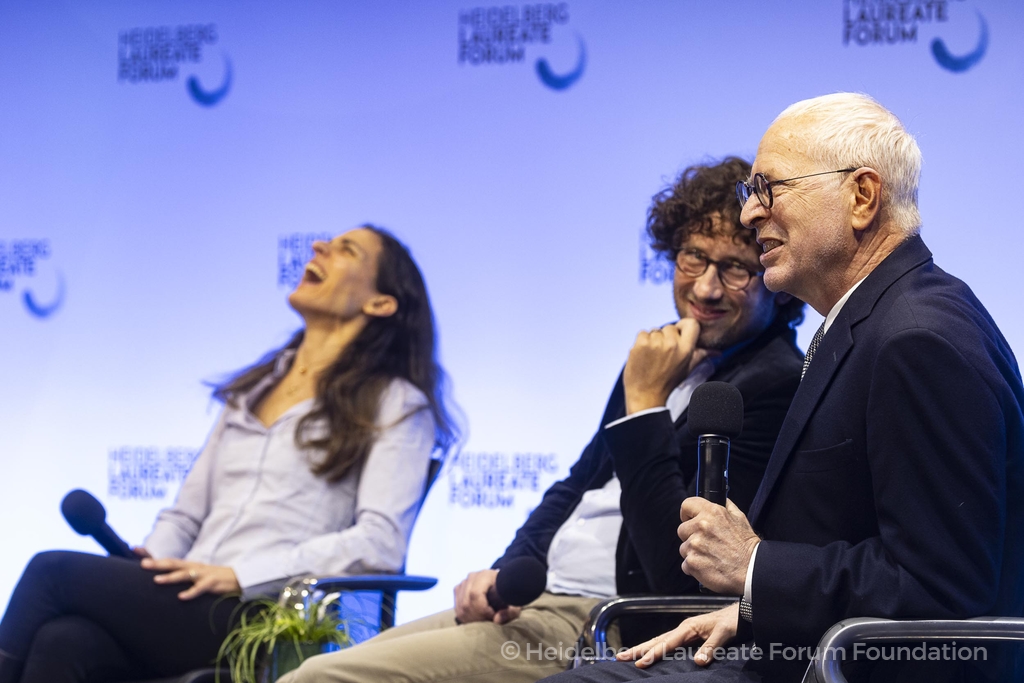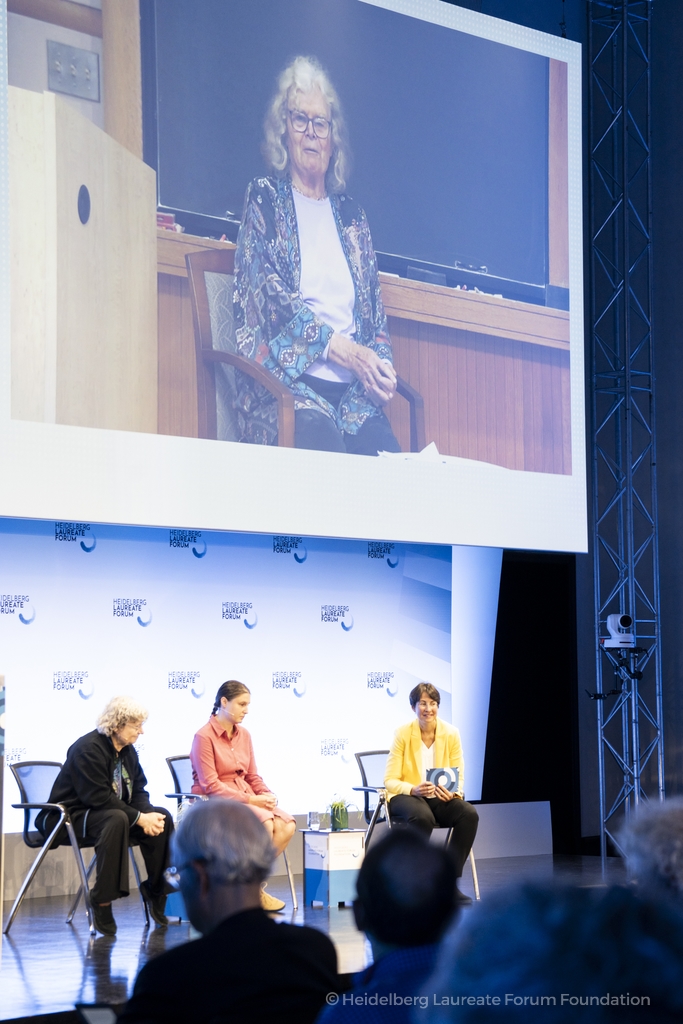Why People Hate Maths, and Why You Should Love It
Sophie Maclean
“Oh, I hated maths at school.”
It is a phrase every mathematician has heard time and time again. Indeed, just in the past month, I have found myself explaining the joy and value in learning maths at parties, in schools, and even on national news. So why is enjoying mathematics so controversial?

Maths Is Not Scary
I feel that a large reason why people do not like maths is because they feel that they are not good enough. Maths can be hard. I can promise you that there is nobody reading this who has not at some point in their lives struggled with a bit of mathematics. This can understandably be disheartening but also can make people afraid of maths.
This was echoed during the 10th Heidelberg Laureate Forum (HLF) this year on a panel on this very subject, “Why Do So Many People Hate Mathematics?” Robert Tarjan, recipient of the 1982 Nevanlinna Prize and the 1986 ACM A.M. Turing Award, suggested an alternative title for the laureate discussion. He posited that perhaps “why do some many people fear mathematics” would be more appropriate. “I think all of us fear things we can’t understand or fear things we can’t do,” he explained. Hugo Duminil-Copin (Fields Medal – 2022) agreed, saying, “we are all a bit afraid of things we don’t know.”
This feeling is often more pronounced in mathematics than in other subjects, as it can seem very black and white as to whether you understand something. In history for example, there are more shades of grey when you might be able to follow the story of what happened at a particular time, but not understand the significance. Or in philosophy, you could disagree with all your contemporaries but have an explanation for your view and it is therefore still valid. In maths, there is rarely such an in-between zone.
Another feature of maths is that it can be very obvious when you do not understand something. Perhaps when reading Shakespeare, you might wildly misinterpret the meaning of Hamlet’s soliloquy, but you can continue your day in blissful ignorance. You can go for years misunderstanding the meaning of a word and not realise it. Whilst this is possible in maths, it is rarely the case. Generally, if you do not understand something, you are painfully aware of that fact.
This aligns with my own experiences. I am currently an early career researcher, undertaking a PhD in mathematics (specifically analytic number theory). Like everyone, I have had times when I have found myself wrestling to get my head round a mathematical concept. I have been lucky though. When I did flounder, I had great teachers who made sure I realised this was normal and instilled in me the importance of perseverance. But often it is the teachers’ reaction in this situation that can make or break a person’s relationship with maths.
It saddens me how frequently, upon questioning why somebody does not like maths, it transpires that they had a teacher who was too strict and made them feel small and stupid for not understanding maths. The issue of feeling as if you are lacking for not understanding maths is something that goes far beyond the classroom.
As a society, we seem to have decided that not being good at maths equates to not being intelligent, or worse, to being stupid. Yael Tauman Kalai (ACM Prize in Computing – 2022) shares my concerns about this. During the panel, she noted that the same does not, for example, happen for music and this is part of why people fear maths so much. People worry that failing at maths will cause others to look down on them, which can lead to them being too afraid to try. Moreover, we all know how much more difficult it is to think when under pressure and stressed.
I have a lot of empathy for those nervous about how others will react if they fail at maths. Even with a postgraduate degree to my name, I still find myself struggling with imposter syndrome. I also remember getting upset when revising for my Master’s exams, fretting to a friend that I was going to fail. My friend had to remind me that even if I did, it would not say anything about my moral worth. I needed reminding that any ability to do maths has nothing to do with my value as a person. Yes, these feelings are somewhat different for me than they would be for someone battling through maths exams aged 16, but at their root, the fears and emotions are very similar.
When faced with being made to feel inadequate mathematically, people understandably try to deflect this. Duminil-Copin made the excellent point that when people find maths difficult, they do not blame themselves, they blame maths. What other choice do they have? This in turns leads to a pride in not being good at maths, a phenomenon in modern society which poses its own unique problem.
Maths Is Useful
You can barely go a month without a celebrity bragging about how they failed maths at school and still turned out fine. This makes me incredibly sad, since it puts across the idea that it is cool to be bad at maths. This is a nuanced issue, as I strongly believe that there is no shame in finding maths difficult. Maths is difficult. But accepting that you find maths difficult is worlds apart from bragging about it.
Hugo Duminil-Copin said in his press conference, “the usefulness of mathematics is basically something that everyone in society agrees on,” and I concur. And yet, there seems to be some disagreement as to whether maths is useful to everyone in their everyday lives, and this seems to be the line of reasoning that these celebrities are taking. However, I feel that they are missing the point. Studying maths teaches so much more than just maths, and furthermore, maths does have direct applications in everybody’s lives.
The example that often gets thrown about is taxes. Whilst I agree that being able to calculate taxes is useful, I do not believe this is the most compelling example and it is something many people do not have to do. But everybody should be able to budget. Being able to do the calculations to work out how much you can afford each month, or how much a discount will save you is crucial. With the current cost-of-living crisis, even a basic understanding of inflation can help people realise how far their money will get them (and when they need to push for a pay rise). Yes, one does not need a deep understanding of maths to be able to budget, and yes, calculators and spreadsheets can do much of the work. Nevertheless, without an understanding of the maths, it is so much easier to slip up and so much harder to gain an intuition on affordability.
“But what about Pythagoras’ theorem?” I hear the celebrities argue. “When would I ever need that?” This assertion assumes that every aspect of every subject needs to be useful in your day-to-day life, which is not necessarily the case. I am yet to find myself in a situation in which knowing what an oxbow lake is has been relevant. I have never saved someone’s life by speaking in sentences stacked with similar “ess” sounds, stating that this style is sibilance. Nevertheless, I still believe these were worthwhile things to learn. Because they made me a more rounded person; because they gave me an insight into what higher level geography and English might be like so I could make an informed decision about whether I wanted to study them; and because I think there is value in learning for learning’s sake. I apply the same ethos to maths.
Furthermore, learning maths teaches a lot of lessons that – while abstract – nevertheless serve a purpose. Hugo Duminil-Copin described how he found value in maths for the process of learning. I could not agree more. Learning maths teaches many skills that can be applied to whatever a student goes on to do. Maths teaches how to follow a series of logical steps. It teaches that there are multiple ways to arrive at the same answer. Possibly most importantly, learning maths teaches us how to deal with being stuck.
I credit being a mathematician with a large part of the development of my own resilience. I am no longer fazed if I come across an issue in life that I do not immediately know how to solve. I just apply the same process that I do when facing a similar maths problem. I break it down into smaller steps. If I am unable to tackle the whole problem initially, I see which constituent parts I can tackle. And I do not give up.
One more crucial skill that mathematics teaches students is critical thinking. It teaches people to question “why?” Moreover, it teaches that if you follow an airtight logical process, then you can be confident in the validity of your conclusions. In this age of misinformation, being able to think for yourself is vital. Learning mathematics is only going to help increase these skills.
Maths Is for Everyone
I think that one cause of people’s dislike of mathematics is that maths and specifically mathematicians have an image problem. There is a stereotype of what a mathematician is, and this can put people off who feel that they do not fit that mould.
One of the biggest groups (and possibly the most talked about group) that this affects is women. If you ask an AI image generator to show you a mathematician, chances are it will show you a man. This is unfortunately a fairly accurate reflection of mathematics departments all around the world. It takes courage to go into a profession where you fear you will be one of only a handful of women. Moreover, the fact that the stereotypical mathematician is a man has consequences even for young children, as girls do not realise that maths is even an option for them and can be made to feel abnormal for liking maths in a way that boys are not.
I could write multiple essays about women in maths, but for the purposes of this article, I want to focus on how women feeling out of place can add to their hatred of maths. Yael Tauman Kalai told the sad but all too common story of when her daughter attended maths camp. Her daughter was the only girl there and unsurprisingly did not like it. Her daughter then concluded that she did not like maths, and it took years for her to realise that this was not the case. I have often been the only woman in a room of mathematicians, and I know I am fortunate that this is not an environment I feel uncomfortable in. But I do notice it.
The Heidelberg Laureate Forum is rare in that half of the young researchers attending it are women. It is a breath of fresh air. This year we were lucky enough to have an all-female panel moderated by Anna Wienhard. The panel comprised of Karen Uhlenbeck (Abel Prize – 2019), Maryna Viazovska (Fields Medal – 2022), and Ingrid Daubechies (Wolf Prize in Mathematics – 2023). Having role models like these does a lot to encourage women to study maths and to realise that it is something for people like them. Daubechies told the panel how much meeting Karen Uhlenbeck encouraged her and helped her feel more like she fit in. “Not only did you really exist and were real, but you were wonderful,” she said.
Maryna Viazovska pointed out that “girls start disappearing from mathematics very early,” highlighting that even by the ages of 10 or 12 some girls have decided that maths is not for them. Though we cannot say for certain why this is, very few would disagree that from a young age, girls are given the message that maths and science is for boys – one needs only to do a quick search for children’s clothes to see that those for boys often feature space and dinosaurs whereas girl’s clothes have ballerinas and flowers. Switch on the TV and more often than not, the characters who unashamedly love maths will be male (for example in The Big Bang Theory). Then there are the well-meaning but slightly patronising comments, the likes of which I remember receiving all throughout my childhood – “It is great to see girls doing well at maths.” It is death by a thousand cuts for a young girl who likes maths.
Even putting aside the gender of a mathematician, preconceptions of mathematicians are still damaging. As Yael Tauman Kalai so plainly put it “You have to be a nerd to like math?! Is that a pre-requisite?!” She is right. There is a pervasive idea that all mathematicians are socially awkward and weird. This is, of course, not true, and simply unhelpful. Why would anyone want to study maths if they thought it meant they were weird?
Another facet of this is that it can lead to a feeling of inadequacy – even among mathematicians – that can dissuade people. I sometimes worry that I am not a good mathematician, as I do not spend all day every day thinking about the subject. It was a relief to hear Ingrid Daubechies say in the HLF panel: “Once I have solved the problem, writing the paper is usually a chore.” Maryna Viazovska also told a story with a similar sentiment that I am sure everyone can relate to: “I think I was a Bachelor’s student and I was supposed to prepare for exams, but I did not want to prepare for the exams.”
I think that if more people knew that being a mathematician does not mean loving the subject all the time (and nor does it mean being a genius) then people would feel a lot more at home in the subject.
Maths Is Fun
One final reason that I think people hate maths is they are unaware of what exactly maths is. Maths is far more than sitting alone solving sums. It is a beautiful subject full of collaboration, puzzles, and joy.
You will get a very different response when asking people whether they like maths versus asking them whether they like Sudoku. It is, however, the same kind of thinking that underpins both. At its core, maths is just solving increasingly complicated puzzles and it can have the same thrill.
I have only dipped my toes into why I believe people dislike maths (and why I respectfully disagree). This does not explain how we can solve this problem, either. Hopefully, we can chip away at the stereotypes and work to educate people on the true value in mathematics.
If I were to end this article on a serious note, I would relay the advice imparted by the laureates. I would tell you how Yael Tauman Kalai encouraged the young researchers in attendance to be role models for the next generation, saying “we’re looking for people like us.” I would relate Bob Tarjan’s call to action: “It’s up to you, the future generation, to try to improve things.” But instead, I will leave you with Hugo Duminil-Copin’s thoughts on why so many people hate maths: “Because there are so many people!”

The post Why People Hate Maths, and Why You Should Love It originally appeared on the HLFF SciLogs blog.

